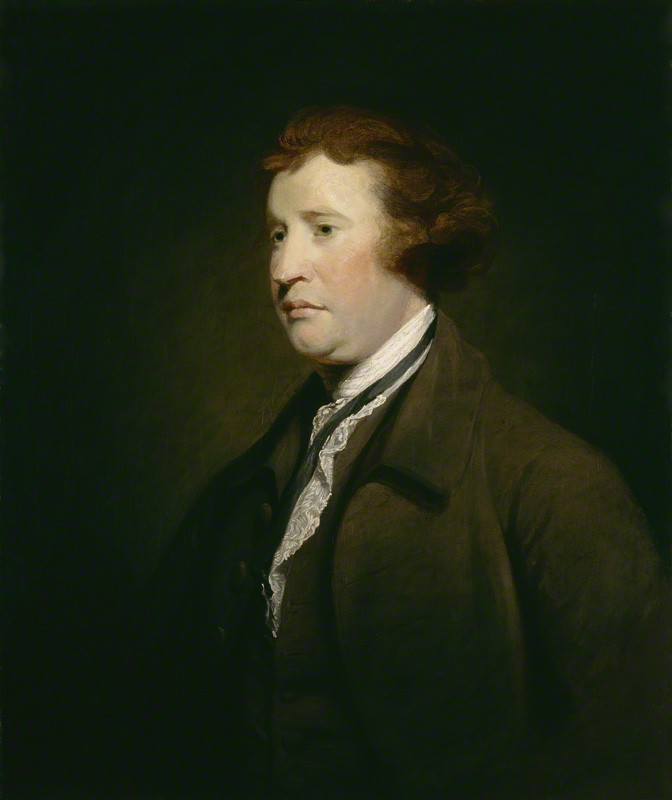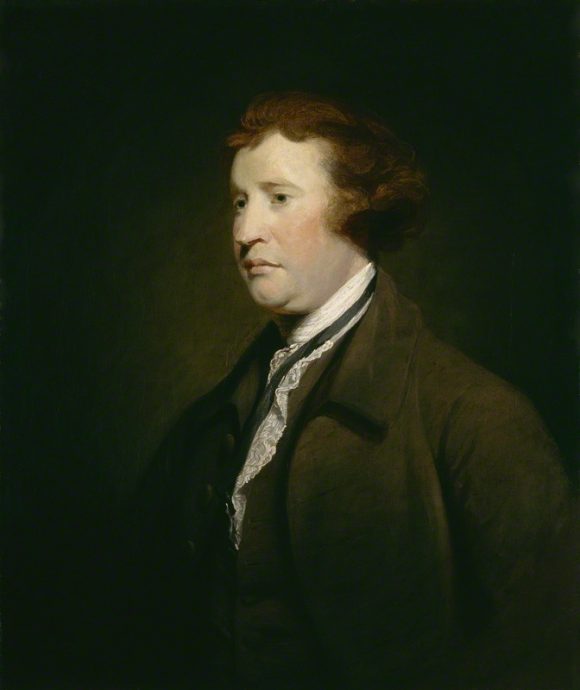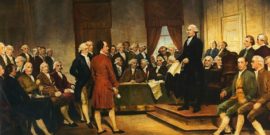The American Founding contained Aristotelian elements of natural right—especially concerning property—that insulated it from modernity's corrosive effects.
"The god of this lower world"
 Edmund Burke, mobilizer of theoretical resistance to the French Revolution in the face of all odds, pursuer of Warren Hastings in the face of certain defeat, lived a political life so seemingly incautious that by its end he had to ask to be buried in an anonymous grave lest the Jacobins, on their inevitable march across his beloved island, exhume and violate his bones. Yet he described prudence as “the first of all virtues.”
Edmund Burke, mobilizer of theoretical resistance to the French Revolution in the face of all odds, pursuer of Warren Hastings in the face of certain defeat, lived a political life so seemingly incautious that by its end he had to ask to be buried in an anonymous grave lest the Jacobins, on their inevitable march across his beloved island, exhume and violate his bones. Yet he described prudence as “the first of all virtues.”
Clearly, then, that quality transcended mere reticence or risk-aversion—what Burke called a “false reptile prudence.” Yet prudence also transcends our contemporary political vocabulary, which is exhausted by Saturday Night Live parodies of the last president, George H.W. Bush, who thought the word worth invoking.
The elder Bush, recently commemorated on the 25th anniversary of his presidency, has been described as the greatest living president. The contemporary observer’s surprise that prudence would justify such a proposition suggests that quality needs to be excavated from its desiccated colloquial usage, which frequently associates it with pragmatism, and replanted in the richer ancient and medieval soil in which thinkers from Aristotle and Aquinas to Burke and Niebuhr bloomed. What, for them, did prudence mean? For Aristotle, its essence lay in the capacity to choose right ends and the means of attaining them. Aquinas ranked it among the four cardinal virtues essential to the perfection of man’s nature, the one that governed other moral capacities because it anchored them in concrete circumstance.
For both Aristotle and Aquinas, prudence was developed and exercised in a political context, but it is with Burke that its explication in connection with statesmen is most associated. There too, as in Aquinas, its essence lay in the application of principle to circumstance. But most important, Burkean prudence must also be understood in the context of its opposite: abstract theory untethered from the concrete and experienced. “Matters of prudence are under the dominion of circumstance, and not of logical analogies,” Burke wrote in his Letters on a Regicide Peace. “It is absurd to take it otherwise.”
The problem with abstract reasoning unmoored from history and circumstance was its destructiveness of authority—since no government could withstand the kind of scrutiny it produced—and its propensity toward the extreme, given that the sacrifice of a few heads would always be worth the seeming greater good of attaining the abstract principle. Contrary to a narrative common among his contemporary critics, Burke did not stumble across this discovery amid the atrocities of the French Revolution. He was onto it as early as his commentaries on America. He wrote in 1777:
There are people who have split and anatomized the doctrine of free government, as if it were an abstract question concerning metaphysical liberty and necessity, and not a matter of moral prudence and natural feeling. … These shocking extremes provoking to extremes of another kind, speculations are let loose as destructive to all authority as the former are to all freedom; and every government is called tyranny and usurpation which is not formed on their fancies.[1]
Burkean prudence also manifests the humility appropriate to the human condition, in which excessive rectitude, especially accompanied by excessive certainty, could be a vice: “Moderation, prudence, and equity are far more suitable to our condition than loftiness, and confidence, and rigor.” The “logical analogies” he rejected attempted to apply rigid and simplistic formulas to human society whose infinite complexity lay beyond the grasp of human reason. This was a moral rather than a pragmatic case for compromise, one rooted not merely in social peace but in the unlikelihood of one person, especially oneself, possessing the whole of goodness and truth. One of the Reflections’ most enduring prophecies thus warns: “Moderation will be stigmatized as the virtue of cowards, and compromise as the prudence of traitors,” forcing political leaders to abandon “sober purpose[s]” to radical plans and the extreme powers they necessitate.
Burke, who some would say pursued Warren Hastings beyond the bounds of prudence over accusations that the latter violated the natural rights of Indians, surely did not mean there were no moral absolutes, nor did he need tutelage on what Leo Strauss denied him, “the nobility of last-ditch resistance.” He did mean there were limits of the human capacity to apprehend those absolutes and that prudence, which made those principles concrete insofar as they could be ascertained, was therefore the political virtue par excellence.
Nothing universal can be rationally affirmed on any moral or any political subject. Pure metaphysical abstraction does not belong to these matters. The lines of morality are not like the ideal lines of mathematics. They are broad and deep as well as long. They admit of exceptions; they demand modifications. These exceptions and modifications are not made by the process of logic, but by the rules of prudence. Prudence is not only the first in rank of the virtues political and moral, but she is the director, the regulator, the standard of them all. Metaphysics cannot live without definition; but Prudence is cautious how she defines.
The problem—this would not surprise but surely would trouble Burke—is that political actors are positively punished today for being cautious as to how they define their agendas. By contrast, Burkean prudence writ onto contemporary politics accepts the fact that the complexity of society and the inherent limitations on human reason confine political ambition. Rather than to abstract reasoning, which is insufficiently supple and comprehensive to grasp all the subtleties and infinite permutations of circumstance, it looks to the history in which those permutations have played out. Consequently, it is suspicious of policies predicated on long and prospective causal chains: If one does this, someone else will do that; thus-and-such will ensue; multiply, rinse, repeat.
Burkeanism also rejects universalistic as opposed to historical assertions of natural rights such as those that have given American foreign policy a crusading rather than prudential cast. That is by no means to say foreign policy should have no ideational elements—certainly Burke’s urging of Britain not to treat with the regicidal French did—only that they should be rooted in history and concrete circumstance and be bounded by prudential judgment and humility that accepts the limitations imposed by complexity.
Often, for those very reasons, prudence does counsel caution. On other occasions—and Burke lived through many of them—it does not. The catch is that telling the difference is itself a task for prudence—“the god,” as Burke put it, “of this lower world.”[2] Defects, disappointments, catches and all, that is the world in which we live. Attempts to make it into a higher one have worked out poorly.
[1] Letter to Sheriffs of Bristol on the Affairs of America, 1777, Works of Edmund Burke in Twelve Volumes, Volume II (MobileReference).
[2] Ibid.



